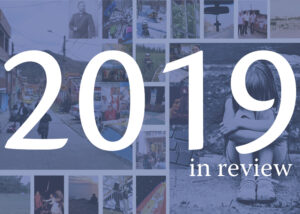Are dreams and visions welcome in the Mennonite church?
Re: “Retreat sparks women’s spiritual gifts,” Nov. 23, 2015, page 17.
I saw the advertisements for the Mennonite women’s retreat at Camp Squeah last fall event and initially got excited about the topic, “Igniting our spiritual gifts.” After some thought, however, I decided not to go due to my assumption that gifts like mine would not be in great focus and it would not be an ideal setting for me to open up and find understanding, teaching and growth.
Upon reading the statement, “Our specific gifts may be quite different from Timothy’s,” my discomfort came a little more into focus. I feel like in the Mennonite church it is assumed that our gifts only fall into certain categories.
Some churches fail by elevating what they consider to be more flashy gifts like prophecy or healing over other equally important functions of the children of God. However, I sometimes feel that the Mennonite church fails in assuming that its children no longer function in these capacities and fails to disciple similar gifts as well.
I know I am not the only Mennonite who dreams dreams and sees visions. I feel like there isn’t a lot of room for discussion on these points, so people shut down these gifts, instead of growing and loving God through them. The thing that gives me hope and comfort, however, is that this trend isn’t normally due to the scarring of having watched these gifts being misused, but, rather, a lack of personal exposure and a focus on a “heady” faith.
Although my brothers and sisters in my home church do a great job of loving me, I still feel lonely. I crave the opportunity to use and grow the gifts I have been given and it seems hard to find that in the Mennonite Church.
Janna Janzen, Vancouver
Another reader ‘sickened’ by Leis coverage
Re: “Coverage of Vernon Leis called ‘disrespectful’” letter, Nov. 9, 2015, page 9.
I agree with Irvin Jantzi’s letter, and was also sickened to think Canadian Mennonite would publish something that was alleged about him.
Many of us know the well-respected and loved Leis family, and are so very sorry that they must suffer like this. It is so unnecessary.
Edith Regehr, Rosthern, Sask.
Call to witness is ‘mandated in the life and teachings of Jesus’
Re: “Jesus in a world of upheaval,” Oct. 12, 2015, page 8, and “Ready to listen and learn,” Nov. 9, 2015, page 9.
While challenging us to love people unconditionally, Phil Wagler strongly suggests in his Oct. 12 column that “in a world in upheaval” we have “unprecedented” opportunities to verbally introduce people to Jesus Christ. In contrast, Katie Doke Sawatzky, in her Nov. 9 column, asserts, “It’s now time for listening, and for helping with open hands and closed mouths.” She correctly reminds us of the devastating effects of colonial Christian evangelism.
Mennonites need to be applauded for their Christ-motivated service, peace and justice activities. However, an underdeveloped part of Mennonite witness is the ability to verbalize our faith in Christ in appropriate ways, whether on personal or societal levels. How do we discern when to speak and when not to? How do we speak about our faith without being manipulative? How do we develop a healthy self-confidence that can guide someone in becoming a Christian? What language speaks in our post-Christendom culture?
Many of us have reacted to an evangelism that is narrowly individualistic and divorced from sustained relationships, but the call to speak about our faith in Christ is mandated in the life and teachings of Jesus. Why would we avoid that part of witness? Can we together work at an alternative to colonialism, one that integrates peace, justice and service, and one in which mutuality in relationships flourishes?
We are indeed living in an “unprecedented time,” when people may well be open to the love of God in Christ Jesus. Can we learn to talk about what Christ means to us, not only in church but also with our neighbours, on the ball diamond, in our places of work and at city hall?
Hugo Neufeld, Calgary
Allegations of impropriety require due process
I appreciated the editorial “More transparency please” (Dec. 14, page 2). No one wants to see persons who trespass appropriate boundaries protected. No one. No one wants to see victims placed in a setting where they might be re-victimized. That’s why we have administrative due process.
At the same time, an allegation is an allegation. There need to be appropriate protocols in place to protect a person from spurious allegations, as well as protecting the person making the allegation, until appropriate verification can take place. It is called due process and it protects everyone by ascertaining facts.
Just as some of us applauded the truth-telling by Sara Wenger Shenk, president of Anabaptist Mennonite Biblical Seminary, we also applaud the call to transparency, which is a verifiable process that establishes facts beyond a reasonable doubt.
Barking at the messenger and making allegations that the editor doesn’t “understand” is just nonsense. Transparency of process protects everyone with the truth.
Walter Bergen, Chilliwack, B.C.
God’s word and gay marriage
In Romans 1:21 we read, “[A]lthough they knew God, they did not glorify Him as God . . . Therefore God also gave them up to uncleanness, in the lusts of their hearts, to dishonor their bodies among themselves . . . women exchanged the natural use for what is against nature . . . men with men committing what is shameful” (NKJV). Is this what believers of a church should engage in, or tolerate?
Mary Giesbrecht Friesen, Winnipeg, Man.






Leave a Reply
You must be logged in to post a comment.